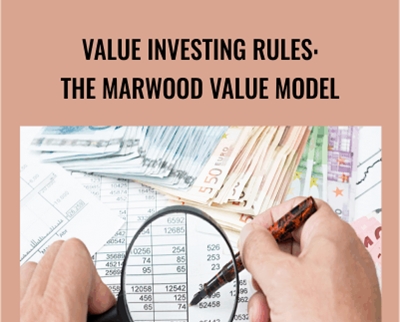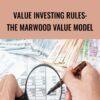$95.00 Original price was: $95.00.$33.00Current price is: $33.00.
Please be informed that this strategy (like other value strategies) has under-performed significantly in recent years. While it could rebound there is a reasonable probability that the system is no longer effective.
 Purchase this course you will earn 33 Points worth of $3.30
Purchase this course you will earn 33 Points worth of $3.30Elevate your skills with the Value Investing Rules: The Marwood Value Model – Joe Marwood course, available for just $95.00 Original price was: $95.00.$33.00Current price is: $33.00. on Utralist.com! Browse our curated selection of over 60,000 downloadable digital courses across diverse Uncategorized. Benefit from expert-led, self-paced instruction and save over 80%. Start learning smarter today!
Value Investing Rules: The Marwood Value Model
Discover 10 simple rules for investing in the stock market. A quantitative value investing system with excellent historical returns.
Update January 2020
Please be informed that this strategy (like other value strategies) has under-performed significantly in recent years. While it could rebound there is a reasonable probability that the system is no longer effective. As a result we are no longer trading or following this strategy but may revisit it in 6 months time. The course will be left open since it contains some useful info for strategy development and using P123.
The Marwood Value Model is a quantitative value investing strategy that I developed to find cheap stocks. It is based on 10 simple rules and can be deployed on it's own or as part of a diversified portfolio of strategies.
Whether you're an experienced stock market investor or you're looking to buy stocks for the very first time, this course will show you a hassle-free way to find deep value investments.
Quantitative Value Investing is is a form of value investing that analyzes fundamental data such as financial statements, economic data, and unstructured data in a rigorous and systematic manner.
The Marwood Value Model is based around 10 key rules for buying and just one rule for selling.
Of course, the rules are not simply plucked out of thin air. They are grounded in the principles of successful value investing and take their cues from successful value investors such as Warren Buffett, Benjamin Graham, Peter Lynch and others.
The nature of this strategy makes it both highly flexible and easy to use. Entries and exits are made every two weeks, which means this is another stock market strategy that requires very little maintenance.
It is the perfect strategy to combine with another system, such as a trend following system, a growth investing system, or even a simple buy-and-hold approach.
Get Value Investing Rules: The Marwood Value Model – Joe Marwood, Only Price $37
Impressive Historical Performance
Using the latest analytical software, I take the 10 value investing rules and I apply them to historical stock market data. The results are recorded live and show an impressive 19 percentage point outperformance against the benchmark S&P 500*.
Over the last 15 years, this strategy was shown to produce annual returns of 21.50% (red line below) with a maximum drawdown of just 30% and a Sharpe ratio of 0.90.
Meanwhile, the S&P 500 (blue line below) has only been able to return 2.28% annually in that time.

*Results are based on simulated or hypothetical performance results that have certain inherent limitations. Make sure you have read and understood the accompanying terms of use and risk warning. Past results are not necessarily indicative of future results.
Course Curriculum
Before We Begin
- Important disclaimer
- How to take this course and get in touch.
- What's this course all about?
- Recent Performance
- Introduction (4:33)
Goals, Tools & Some Theory
- Goals of the course. (2:18)
- Some theory & why you need investing rules. (2:10)
- Tools we will be using. (3:29)
- Evidence of value investing and principles. (2:04)
- Our benchmark. How to measure performance. (4:32)
- The S&P 500 is a trading system. David Harding from Winton Capital speaks.
- Benjamin Graham's investing rules.
Getting Started
- A word about data mining and optimisation. (4:01)
- Transaction costs, survivorship-bias and other settings. (3:01)
The 10 Rules
- Rule zero: liquidity. (3:01)
- Rule one: market cap. (1:05)
- Rule two: minimum price filter. (0:32)
- Rule three: PE ratio. (3:53)
- Rule four: forward PE ratio. (1:46)
- Rule five: price-to-sales. (1:57)
- Rule six: price to book (2:44)
- Rule seven: price-to-free-cash-flow (1:34)
- Rule eight: current ratio. (1:24)
- Rule nine: 5-year EPS growth. (1:32)
- Rule ten: momentum. (1:54)
When To Sell
- Sell rule one. (4:10)
Get Value Investing Rules: The Marwood Value Model – Joe Marwood, Only Price $37
Risk & Ranking & Finer Details
- Risk: how many shares to buy. (3:22)
- Extra important details. (2:40)
- Ranking criteria: how to choose between stocks. (1:30)
- Capital requirements.
Back-Testing The Rules
- Setting up the simulator with the 10 rules. (5:32)
- Back-testing the rules on historical data: in-sample and out-of-sample (2:19)
- Full sample test: 2000 – 2015. (3:33)
- Performance Reports & Statistics.
Stress-Testing
- Stress-testing the strategy (6:43)
Some Finer Points
- Strategy advantages & disadvantages. (2:33)
- Introducing ETFs into the mix. (3:16)
- Marwood Value: loose version (2:17)
Extra Rules (Qualitative)
- Rule 11: understand the business. (1:04)
- Rule 12: insider transactions. (1:28)
- Rule 13: consistency of earnings. (1:06)
- Rule 14: keep a macro view. (2:06)
- Rule 15: don't put all your eggs in one basket. (0:53)
- Rule 16: profit warnings & chart patterns. (2:12)
- Rule 17: don't gamble. (2:08)
- Rule 18: analyse your performance. (1:09)
- Rule 19: look for compelling story lines. (1:38)
- Rule 20: ignore the noise. (1:32)
Going live
- How to run the strategy live (3:02)
- How to trade the strategy live (in plain language)
- Important Observations: Watch Out For These
- Tax implications.
The End
- Conclusion (0:36)
Additional Material
- Marwood Value Model Full eBook
- Clarification on the sell rule.
- New Bonus Strategy: Income Grower
- Should you wait for the next market crash? Buy-and-hold facts.
Resources
- Support
- Further reading.
- Music credits.
Get Value Investing Rules: The Marwood Value Model – Joe Marwood, Only Price $37
Tag: Value Investing Rules: The Marwood Value Model – Joe Marwood Review. Value Investing Rules: The Marwood Value Model – Joe Marwood download. Value Investing Rules: The Marwood Value Model – Joe Marwood discount.
Cultivate continuous growth with the Value Investing Rules: The Marwood Value Model – Joe Marwood course at Utralist.com! Unlock lifetime access to premium digital content, meticulously designed for both career advancement and personal enrichment.
- Lifetime Access: Enjoy limitless access to your purchased courses.
- Exceptional Value: Benefit from savings up to 80% on high-quality courses.
- Secure Transactions: Your payments are always safe and protected.
- Practical Application: Gain real-world skills applicable to your goals.
- Instant Accessibility: Begin your learning journey immediately after buying.
- Device Compatible: Access your courses seamlessly on any device.
Transform your potential with Utralist.com!
Related products
Uncategorized
Legal Risks in Nursing Documentation – Use Extreme Caution When Skimming the Facts – Rosale Lobo
= 40 Points
Uncategorized
= 85 Points
Uncategorized
Managing Geriatric Behaviors: Wandering, Aggression, Malnutrition and More – Steven Atkinson
= 35 Points
Uncategorized
Proven Fall Prevention Strategies: Exercise, Meds Management and Home Modification – Trent Brown
= 40 Points
= 94 Points
Uncategorized
= 85 Points
Uncategorized
= 85 Points
Uncategorized
= 35 Points






